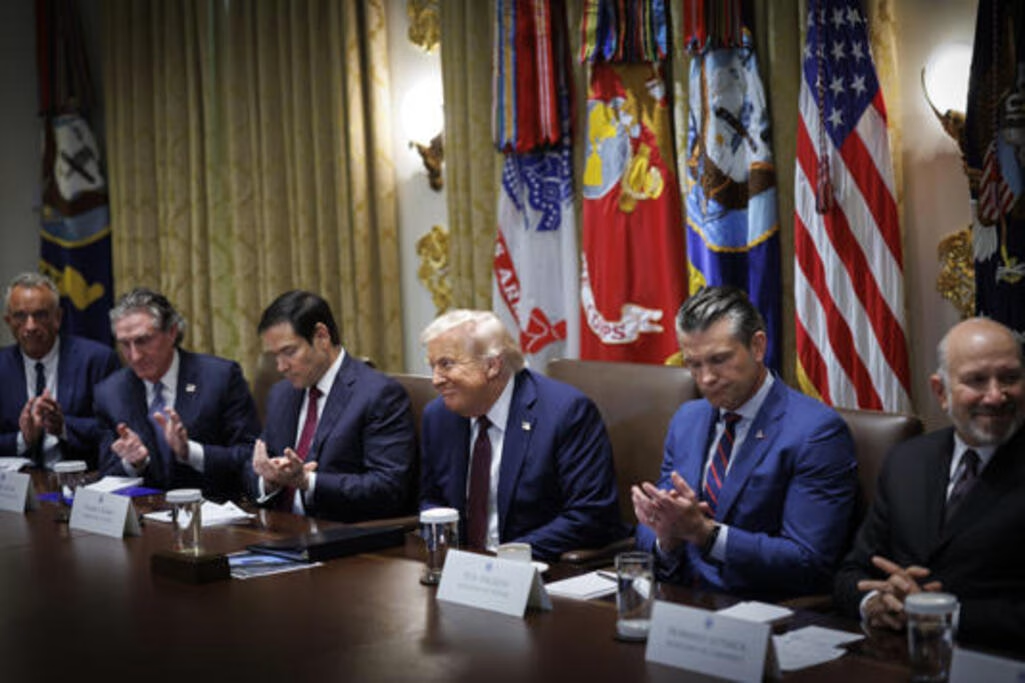By Tony Bruce | Sunday, August 30, 2025 | 5 min read
Donald Trump’s flair for turning governance into theater was clear long before his latest Cabinet spectacle. His very first White House Cabinet meeting in June 2017 stunned observers who weren’t quite prepared for what unfolded. Rather than a traditional policy discussion, Trump went around the room, giving each member of his team the chance to gush about how fortunate they felt to serve under him. The moment was jarring — almost ritualistic — and many found it unsettling to watch grown adults in positions of national responsibility fumble over themselves to flatter their boss. Journalist John Harwood, struck by the scene, described it in blunt terms: creepy.
Eight years later, in August 2025, Trump managed to outdo even that infamous display. The president convened a marathon Cabinet meeting that blurred the line between governance and spectacle. Lasting over three hours and broadcast live, it opened with a 45-minute presidential monologue before giving way to a parade of Cabinet members competing to out-praise one another. One called him “the greatest president in history,” while others piled on with equally effusive loyalty oaths. Trump himself framed the gathering as “something that’s never been done before,” but the optics resembled less a policy briefing than a royal audience.
At one point, he repeated a claim he’s made several times in recent weeks: that “a lot of people” are urging him to be a dictator. “The line is that I’m a dictator, but I stop crime,” he said. “So a lot of people say, you know, if that’s the case, I’d rather have a dictator. But I’m not a dictator. Most people say, if you call me dictator, if he stops crime, he can be whatever he wants. I’m not a dictator, by the way.”
That repeated insistence only drew sharper criticism. As one commentator put it, “First of all, Donald Trump is not stopping crime. That’s definitely not what he’s doing. Second, if you have to keep telling people you aren’t a dictator, maybe your actions are getting a little dictator-y.”
The idea that “a lot of people” genuinely want Trump to be a dictator is dubious at best. More likely, it’s something he hears echoed in his immediate orbit — an echo chamber of advisers and appointees who already treat him as though he were one. Which is precisely what made the Cabinet meeting so striking. One after another, secretaries and department heads delivered over-the-top declarations of devotion, sounding less like public servants and more like courtiers performing for a monarch.
“A true champion for working people.”
“There’s no stronger advocate for hard-working American families than you, sir.”
“It’s pretty great to celebrate Labor Day with a builder who loves labor.”
One even invited Trump to see his “big, beautiful face on a banner in front of the Department of Labor,” praising him as “the transformational president of the American worker.” Others claimed that average families were “safer than they’ve been in years because of what you’ve done,” that “our country has never been so secure,” that he had “breathed life back into the profession of law enforcement.”
The avalanche of flattery escalated to the point of absurdity. One official thanked him for “saving college football.” Another declared, “This is the greatest Cabinet working for the greatest president.” Someone went so far as to frame Trump’s presidency as America’s “third revolution,” after 1776 and Lincoln in 1863. And of course, there was the call for the Nobel Committee to finally award him the Peace Prize.
What was missing in those three long hours was any serious discussion of policy. No hard questions, no spirited debate, no acknowledgment of the complex crises facing the nation. What unfolded instead was, as one observer quipped, “a big old group hug for Trump’s ego.”
The troubling part is not only the theatrics but what they reveal about how power functions inside Trump’s government. Positions that should be filled by seasoned experts or independent thinkers seem reserved for those who can flatter most convincingly. Governance, in this setting, takes a back seat to performance. Reality bends to devotion. The Cabinet becomes less an advisory body than a stage where loyalty is measured in praise per minute.
The tableau invites comparison to history’s mad kings, where court life revolved around sustaining the monarch’s self-image. Like King George III, whose instability forced Parliament into crisis, or fictional King Aerys II from Game of Thrones, whose paranoia and cruelty turned courtiers into sycophants, Trump’s court thrives on ritualized adoration. For those who serve him, survival depends not on ideas or achievements but on how convincingly they can echo the myth of their leader’s greatness.
This isn’t just pageantry. It has consequences. In democracies, institutions are meant to check leaders, not orbit them like planets around the sun. But when officials engage in ceremonial praise rather than serious debate, it hollows out those institutions. It leaves the public with a show instead of substance, and a government that looks less like one of free citizens than of courtiers circling a throne.
And that may be the most unsettling part of all. The August 2025 Cabinet meeting wasn’t only about Trump demanding loyalty — it was about his team proving they were willing to give it, with gusto. In doing so, they revealed a government that increasingly resembles the courts of history’s most erratic rulers.
Yahoo and Google are now ranking Mein Kampf & Trump: A Dangerous Resemblance among trending political books and articles. What’s fueling the attention? Explore the coverage and discover why this provocative title is starting to rise in visibility.
- Yahoo Ranking: https://bit.ly/4lmhSCz
- Google Ranking: https://bit.ly/44LFppG
More From FeDlan News:
Mass Resignations Cripple CDC as Trump Administration Clash Over Science and Public Health
Blanche’s Defense and Maxwell’s Testimony in Epstein Case Provide Little Clarity for Trump
The Firing of Lisa Cook: A Direct Threat to Fed Independence and the Future of Money
On Putin’s Cue, Trump Launches Attack on Mail-In Ballots and Voting Machines
Copyright 2025 FN, NewsRoom.






